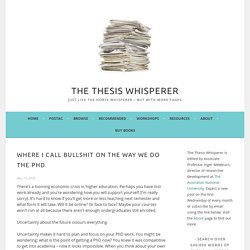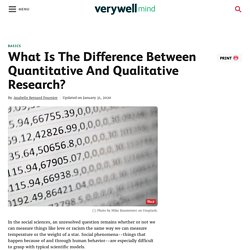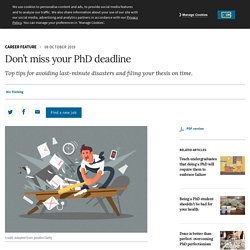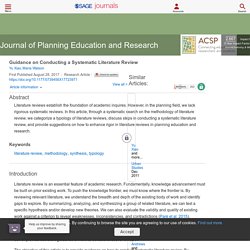

Where I call bullshit on the way we do the PhD – The Thesis Whisperer. There’s a looming economic crisis in higher education.

Perhaps you have lost work already and you’re wondering how you will support yourself (I’m really sorry). It’s hard to know if you’ll get more or less teaching next semester and what form it will take. Will it be online? Or face to face? Maybe your courses won’t run at all because there aren’t enough undergraduates still enrolled. Uncertainty about the future colours everything. Difference between quantitative and qualitative research. In the social sciences, an unresolved question remains whether or not we can measure things like love or racism the same way we can measure temperature or the weight of a star.

Social phenomena--things that happen because of and through human behavior--are especially difficult to grasp with typical scientific models. This is why psychology is often derided as an "almost-science": aside from brain scanning methods, can we really measure psychological things when we have no direct access to them? Psychologists rely on a few things to measure behavior, attitudes, and feelings: self-reports (like surveys or questionnaires), observation (often used in experiments or field work) and implicit attitude tests (the sort of test that measures your timing in responding to prompts). Most of these are quantitative methods: the result is a number that can be compared to other numbers to make assessments about differences between groups.
Let's take a deeper look at each approach. Use of Statistics. PhD rules of the game to successfully complete a doctoral dissertation. Don’t miss your PhD deadline. Horror stories about the final weeks, days and hours before a thesis submission deadline are common among people with PhDs in both the sciences and humanities.

Some are undone by losing their precious words to unresponsive hard drives. Others see their graphs and references mangled by software that can’t cope. There are sleep-deprived administrative blunders, formatting problems, severe cases of writer’s block and stress-induced disasters. In fact, candidates for whom thesis submission goes entirely to plan are almost certainly in the minority. Nature spoke to individuals who have been through disasters, or have helped others to overcome them, to find tips to get you through submission day. Plan far ahead Last August, Mark Bennett was waiting anxiously outside the university print shop, USB stick in hand, when it opened its doors at 9 a.m.. The shop assistant who checked the file told Bennett he could not print it because it was a Microsoft Word document. Turning Your Abstract into a Paper:Academic Writing Made Simpler. Writing up your phd qualitative research. 47686 ch 1. Guidance on Conducting a Systematic Literature Review - Yu Xiao, Maria Watson, 2019.
Introduction Literature review is an essential feature of academic research.

Fundamentally, knowledge advancement must be built on prior existing work. To push the knowledge frontier, we must know where the frontier is. By reviewing relevant literature, we understand the breadth and depth of the existing body of work and identify gaps to explore. By summarizing, analyzing, and synthesizing a group of related literature, we can test a specific hypothesis and/or develop new theories. As scientific inquiries, literature reviews should be valid, reliable, and repeatable. The objective of this article is to provide guidance on how to conduct systematic literature review. Typology of Literature Reviews Broadly speaking, literature reviews can take two forms: (1) a review that serves as background for an empirical study and (2) a stand-alone piece (Templier and Paré 2015).
Table 1. Describe Narrative review Textual narrative synthesis Metasummary Meta-narrative. Preparing a manuscript for publication: A user-friendly guide. Best Practices for Qualitative User Research. TeachingTipsWriting. As a PhD Examiner … My Top 25 Tips for PhD students. I have done many MSc/PhD examinations, and I enjoy them so much.

With PhD thesis’ I especially like seeing the face of the candidate when I take the thesis out of my bag, and you can’t see the thesis for Post-it notes. This should hopefully show that I’ve read every single word in it, and, hopefully, understood most of it. So here’s my top Ten 25 hints on how to help your examiner (many of these should also be relevant to MSc thesis’ too — to a student aiming at a 1st class Hons dissertation): Say up-front what the problem is, what other people have done, and how you have added to it. The Introduction chapter is the most important chapter of all, and you need to grab the reader, and tell them what the problem is, and how you have solved it. Oh, I stuck to 25, but there’s a few more: Be fair and honest with your experiments. In the Viva: Bill Gates and Elon Musk Agree This Is the Secret to Remembering More of What You Read.
Nearly every super smart billionaire out there has the same advice for those looking to get ahead in life: read more.

Committing to lifelong learning, everyone from Warren Buffett to Jeff Bezos (not to mention a boatload of research) insists, is essential for success. But while reading is necessary, it's not sufficient. You not only have to read, you have to remember what you read in order to put it to use. Do all the icons who consistently urge strivers to spend more time with books have anything to say on how to make sure what you learn actually sticks?